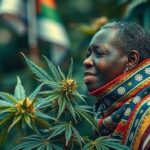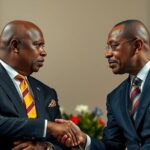New President Duma Boko Focuses on Cannabis and Solar Energy for Economic Growth
Duma Boko, recently inaugurated as Botswana’s president, aims to diversify the economy away from diamonds by exploring medicinal cannabis and solar energy. His administration seeks to attract investments in various sectors to combat rising unemployment and stimulate economic growth. This political transition follows a significant electoral victory, marking the end of nearly sixty years of rule by the previous party.
On November 8, 2024, Duma Boko took the oath of office as Botswana’s new president, marking a significant political shift after a landslide victory that ended nearly sixty years of rule by the Botswana Democratic Party. In his inaugural address, President Boko emphasized the need to diversify the nation’s heavily diamond-dependent economy, highlighting plans to explore the medicinal cannabis market and capitalize on Botswana’s abundant solar energy resources. This initiative follows a notable decline of over sixty percent in diamond revenues in recent years, prompting the government to seek investments in renewable energy, agriculture, tourism, and technology, aiming to stimulate growth and create employment opportunities across various sectors. Furthermore, President Boko underscored the potential for solar energy in Botswana, noting that the nation enjoys over 3,200 hours of sunlight each year, positioning it favorably for renewable energy ventures. Additionally, the government plans to develop medicinal cannabis and industrial hemp to tap into the expanding global market, projecting significant contributions to the nation’s GDP. In light of the country’s high unemployment rates—27 percent overall and 38 percent among the youth—Boko’s administration is also focused on enhancing manufacturing, construction, and fostering youth innovation and entrepreneurship. Notably, partnerships, such as with Elon Musk’s Starlink, aim to improve internet access in Botswana, thereby laying the groundwork for a digital economy. This shift in leadership and economic strategy reflects a responsiveness to public concerns about lackluster economic performance and high unemployment, showcasing President Boko’s commitment to revitalizing and modernizing Botswana’s economy. The political transition has also been notably smooth, with the outgoing party conceding defeat decisively and peacefully, signaling a potential for stable governance moving forward in Botswana.
Botswana has relied on diamond mining as its primary economic driver since its independence in 1966, which constitutes approximately 80 percent of the nation’s foreign earnings. However, recent years have witnessed a significant decline in diamond revenues, prompting calls for economic diversification. The transition to a new government under President Duma Boko signals a concerted effort to modernize the economy and explore alternative sectors, including renewable energy and medicinal cannabis, thus reflecting a broader understanding of the need to adapt in a changing global economic landscape.
In conclusion, President Duma Boko’s administration is poised to implement significant changes aimed at diversifying and modernizing Botswana’s economy. By exploring sectors such as renewable energy and the cannabis market, the government aspires to reduce dependence on diamonds and address the pressing issues of unemployment and economic stagnation. The recent political transition has been notable for its peaceful nature, providing a firm foundation for these ambitious initiatives.
Original Source: www.seychellesnewsagency.com








Post Comment